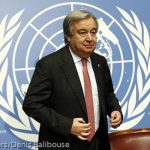
Portugal’s former prime minister Antonio Guterres on Friday strengthened his lead in the race to become the next secretary-general of the United Nations following a fourth straw poll by the UN Security Council, diplomats said.
Guterres, who served as UN refugee chief for 10 years, received 12 votes of encouragement, two “discourage” votes and one “no opinion” during the 15-member council’s informal vote.
It was the fourth time the 67-year-old has taken the number-one spot in the contest to succeed Ban Ki-moon, who steps down on December 31 after 10 years as the world’s top diplomat.
During the last round of straw polls, Guterres had picked up 11 encouragements, three “discourage” votes and one “no opinion.”
The 15 ambassadors, including those from the powerful five permanent members — Britain, China, France, Russia and the United States — met behind closed doors to rate the candidates.
Ten candidates are in the running for the top post, half of them women.
Portugal’s Socialist prime minister from 1995 to 2002, Guterres has pledged to revamp the United Nations to bolster its peacemaking efforts and promote human rights.
If elected, the pro-Europe politician would be the first UN secretary-general to have served as head of government.
French Ambassador Francois Delattre said the selection process was moving toward the nomination of a candidate to be endorsed by the General Assembly.
“It is a positive step… towards getting a candidate that the Security Council can recommend to the General Assembly in the next few weeks,” Delattre told reporters.
– Eastern Europe candidates –
Slovakia’s Foreign Minister Miroslav Lajcak held on to the second spot, with 10 encouragements, four “discourage” votes and one “no opinion,” picking up one more “encourage” vote from the last straw poll.
Four other candidates from eastern Europe had a strong showing: Serbia’s former foreign minister Vuk Jeremic, Macedonia’s ex-foreign minister Srgjan Kerim, Slovenia’s ex-president Danilo Turk and UNESCO chief Irina Bokova from Bulgaria.
Bokova, the leading woman in the race, picked up seven encouragements, five “discourage” votes and three “no opinion,” behind Jeremic’s score of nine encouragements, four “discourage” votes and two “no opinion.”
Kerim received eight encouragements and seven “discourage” votes, while Turk picked up seven encouragements, six “discourage” votes and two “no opinion.”
Russia has said it will give priority to candidates from Eastern Europe, the only region that has yet to be represented in the post.
Four women took the last spots: Argentina’s Foreign Minister Susana Malcorra; New Zealand’s ex-prime minister and head of the UN Development Program Helen Clark; former UN climate negotiator Christiana Figueres; and ex-foreign minister Natalia Gherman of Moldova.
The four came in last despite a campaign by women’s groups and some member-states to elect the first woman to the top post in the UN’s 71-year history.
The secret vote caps a new, more open process that for the first time allowed candidates to appear at hearings to make their pitch for the top job before the General Assembly.
Source: Agence France-Presse (AFP)
 Previous Post
Previous Post Next Post
Next Post